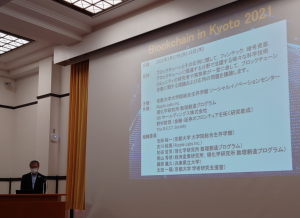On 17 and 18 February, the Centre for Social Innovation of the General Ars Vivendi presided over the hybrid international conference Blockchain in Kyoto 2021 (BCK21).
This international conference was a forum on blockchain and its applications in the fields of fintech, crypto-assets, and
researchers and practitioners from various disciplines working in fields related to blockchain The conference brought together researchers and practitioners from various fields working in the fintech, crypto assets and blockchain-related fields.
One keynote speaker (from the USA) and nine invited speakers (six from Japan, one from the USA and two from Europe) from the broader regions of Japan, the USA and Europe. The conference also featured 13 other public speakers and a number of invited speakers.
Together with 13 other public speakers and a large number of online participants, the conference provided an opportunity to discuss various studies related to blockchain in general, as well as to discuss the academic and scientific aspects of the subject. The conference also discussed various studies on blockchain in general, not only academic issues, but also current achievements and future perspectives in practice. future perspectives were also discussed.
For example, on the morning of 17 February, we invited people who are active in the business world to participate in the The morning of 17 February, for example, we held a session on communicating to society in Japanese, inviting people active in business.
On the morning of 18 February, Mr David Schwartz, CTO of Ripple, a US company known for its cryptocurrency XRP, was invited to speak about the future of cryptocurrency XRP.
Mr David Schwartz, CTO of Ripple, a US company known for its cryptocurrency XRP, was invited to speak about the basic philosophy and future prospects of the cryptocurrency XRP.
Number of registered participants (206 in total)
126 from universities (41 from Japan, 83 from overseas)
79 from companies (16 from Japan, 63 from overseas)
Both universities and companies had a large number of participants from overseas, amounting to approximately 70% of the total number of participants.
The high level of interest in this field abroad was reconfirmed, but on the other hand, the activation of domestic trends was also a major focus.
The Social Innovation Centre is aware that this is an issue that it must tackle in the future.
For this reason, we believe it is necessary to continue holding the second international conference BCK22 in the coming year.
We hope that many of you will join us in this endeavour.
Opening address at the Kyoto University Clock Tower venue on the morning of 17 February.

